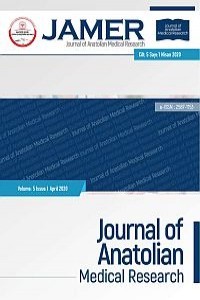Antrokoanal Polipli Hastalara Yaklaşımımız
Polipler, endoskopik cerrahi işlem, nazal Tıkanıklık
___
- Killian, G. (1906). The origin of choanal polypi. The Lancet, 168(4324), 81-82.
- Sabino, H. A. C., Faria, F. M., Tamashiro, E., Lima, W. T. A., & Valera, F. C. P. (2014). Bilateral antrochoanal polyp: case report☆. Brazilian journal of otorhinolaryngology, 80, 182-183.
- Karakoç, Ö., Yıldızoğlu, Ü., Aşık, B., Bınar, M., & Gerek, M. (2011). Nadir bir burun tıkanıklığı nedeni: Frontokoanal polip.
- YAŞAR, M., YILDIRIM, A., BEBEK, A. İ., & KUNT, T. (2007). Sfenokoanal polip. Türk Otolarengoloji Arşivi, 45(2), 105-107.
- Chagarlamudi, K., O'Brien, W. T., Towbin, R. B., & Towbin, A. J. (2019). Antrochoanal polyp. Appl Radiol, 48(1), 38-40.
- Yaman, H., Yilmaz, S., Karali, E., Guclu, E., & Ozturk, O. (2010). Evaluation and management of antrochoanal polyps. Clinical and experimental otorhinolaryngology, 3(2), 110.
- Lee, T. J., & Huang, S. F. (2006). Endoscopic sinus surgery for antrochoanal polyps in children. Otolaryngology—Head and Neck Surgery, 135(5), 688-692.
- Cook, P. R., Davis, W. E., McDonald, R., & McKinsey, J. P. (1993). Antrochoanal polyposis: a review of 33 cases. Ear, nose & throat journal, 72(6), 401-411.
- Knör, M., Tziridis, K., Agaimy, A., Zenk, J., & Wendler, O. (2015). Human papillomavirus (HPV) prevalence in nasal and antrochoanal polyps and association with clinical data. PLoS One, 10(10), e0141722.
- Orvidas, L. J., Beatty, C. W., & Weaver, A. L. (2001). Antrochoanal polyps in children. American journal of rhinology, 15(5), 321-325.
- Min, Y. G., Chung, J. W., Shin, J. S., & Chi, J. G. (1995). Histologic structure of antrochoanal polyps. Acta oto-laryngologica, 115(4), 543-547.
- Špadijer-Mirković, C., Perić, A., Vukomanović-Đurđević, B., & Stanojević, I. (2015). Clinical case report of a large antrochoanal polyp. ACTA MEDICA, 57(2), 78-82.
- Chaiyasate, S., Roongrotwattanasiri, K., Patumanond, J., & Fooanant, S. (2015). Antrochoanal polyps: how long should follow-up be after surgery?. International journal of otolaryngology, 2015.
- Yayın Aralığı: Yılda 3 Sayı
- Başlangıç: 2016
- Yayıncı: Kayseri EAH
Deniz İNCAMAN, Musa SALMANOĞLU, Abdulbaki KUMBASAR, Ömür TABAK
Apixaban nedenli izlenen rektus kılıf hematomu yönetimi ve sonuçları
Antrokoanal Polipli Hastalara Yaklaşımımız
Mehmet YAŞAR, Mustafa ŞAHİN, Ali BAYRAM, Hatice KARAMAN, Cemil MUTLU
Erzurum İli Yakutiye Bölgesindeki Okullarda Kantinlerin Değerlendirilmesi: Kesitsel Bir Çalışma
Sinan YILMAZ, Esra DAHARLI, Zahide KOŞAN
Bir Covid-19 Hastasında Hayatı Tehdit Eden Nadir Bir Mantar Enfeksiyonu
Acil Poliklinik Kullanımı İle Sağlık Okuryazarlığı İlişkisinin İncelenmesi: Kesitsel Bir Çalışma
Sinan YILMAZ, Sultan Tuna AKGOL GUR, Esra DAHARLI
Acil Serviste Ultrasonografinin Farklı Bir Kullanımı; Nadir Bir Boğaz Ağrısı: Dil Apsesi
Emre BÜLBÜL, Aynur YURTSEVEN, Mehtap KAYNAKCI BAYRAM, Duygu ÖZYÜREK, Mustafa ŞAHİN
